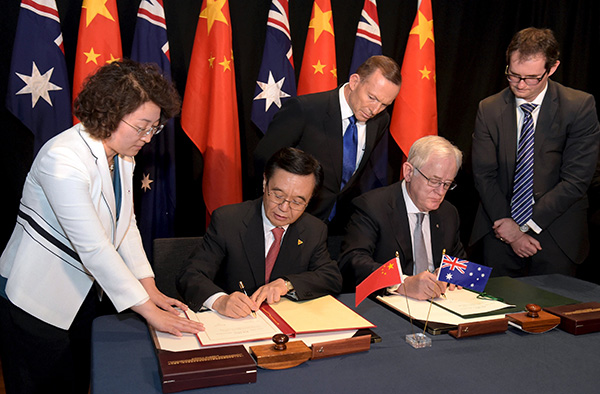Chinese, Australian scholars shed light on Asia-Pacific cooperation

Former Australian Prime Minister Tony Abbott (C) watches as China’s Minister of Commerce Gao Hucheng (2nd L) and Australian Minister for Trade Andrew Robb (2nd R) sign the China-Australia Free Trade Agreement in Canberra on June 17, 2015. (PHOTO: CHINA DAILY)
The Chinese Academy of Social Sciences (CASS) and the University of Queensland in Australia jointly held the second Asia-Pacific Forum in Beijing on Oct. 23. Focusing on the “Role of China and Australia in Promoting Asia-Pacific Cooperation,” the forum included topics such as social and economic change, new mechanisms for regional economic cooperation, and regional security.
Sociology of space
Handling the economic and social imbalances that result from rapid social change and transformation is a challenge for both China and Australia. Mark Western, director of the Institute for Social Science Research at the University of Queensland, said that in Australia, researchers are trying to define which social groups are being negatively impacted by changes in society, and discover the key reasons that lie behind social injustice.
To better understand and solve the social problems, a perspective based on geography and space is introduced. This methodology was proposed by American sociologists several years ago, and a branch of sociology based on this perspective of space has already been set up in the United States. Gradually, the science of geographic information has been introduced to social sciences, and the concept of remote sensing has been linked to social sciences and is being discussed. More and more scholars from the United States and Australia are trying to interpret this sociology of space approach.
“This is a brand new method,” said Liu Yan, from the School of Geography Planning and Environmental Management at the University of Queensland. She then presented two cases that involved this method: misallocations of housing resources and the analysis of neighborhood complaint data. “Adopting a space-based approach, while employing the technology of big data and social sensing, or mapping with the GRS technology to find out the patterns and changes of social problems, can offer effective suggestions for policymakers,” Liu said.
Chen Guangjin, director of the Institute of Sociology at CASS, said that the utilization of GRS technology is quite appealing to Chinese sociologists, and that research in social sciences is likely to benefit from this technological tool.
Economic integration trials
In recent years, a new round of mega-FTAs have been discussed in the Asia-Pacific region, including the Trans-Pacific Partnership (TPP), Regional Comprehensive Economic Partnership (RCEP), and the Free Trade Area of the Asia-Pacific (FTAAP). The use of trans-Pacific cooperation mechanisms and traditional regional cooperation mechanisms in Asia to develop the same region is forging closer relationships between different economies.
The Asia-Pacific region has become the frontier and arena for regional economic integration trials.
“Regional economic integration will change the global value chain,” said Dong Yan, a research fellow from the Institute of World Economics and Politics at CASS. She identified four issues to discuss when assessing the feasibility of a free trade agreement in the Asia-Pacific region: whether it can contribute to regional economic efficiency; whether it can help developing countries to join the global value chain; whether it can help transition countries to upgrade their economy while reducing economic risks; and whether it can promote cooperation and mutual learning among countries in the region.
However, some scholars have pointed out that not all FTAs may be feasible, while some others are becoming more active. The TPP has brought about pressure to some ASEAN countries, including China. To meet the challenges resulting from the TPP, China is being open minded yet cautious. They suggested that China further open the market and promote the building of FTAs cooperating with countries along “the Belt and Road.”
“In 2015, we are going to negotiate more FTAs, which will be conducive to coping with challenges resulting from the TPP,” said Shen Minghui, an associate professor from National Institute of International Strategy at CASS.
Deng Zhimei is a reporter at the Chinese Social Sciences Today.

 PRINT
PRINT CLOSE
CLOSE